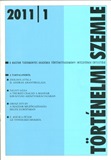Zsoldos Attila: II. András Aranybullája
The Golden Bull of Andrew II
Author(s): Attila ZsoldosSubject(s): History
Published by: Magyar Tudományos Akadémia Bölcsészettudományi Kutatóközpont Történettudományi Intézet
Summary/Abstract: According to the prevailing view, the Golden Bull of king Andrew II (1205–1235) was issued before the end of May in 1222. It is, moreover, generally held to have been pressured out by the movement initiated by the opponents of the king’s policies, enraged before all at the measureless donations of land which he had made. The present study reviews the historical development which led to the issue of the Golden Bull. On the one hand, it gathers all the information which prove the relationship between prince Béla and those leading persons who had once been the confidential supporters of king Imre and later turned against Andrew II. The importance of such an inquiry resides in the fact that in all political actions which were directed against the government of Andrew before 1222 the active participation or even leading role of Imre’s former supporters can clearly be detected. On the other hand, the study analyses the policy commonly known as „new institutions” (novae institutiones), introduced by Andrew II, and the emergence of the new social group constituted by the so-called servientes regales, on the basis of sources long known to scholars but hitherto not examined from this particular point of view. Contrary to the traditional view, which regarded the new policy of royal grants as the only element of the new institutions deserving attention, it proves that these two social phenomena were closely intertwined. As a result, the study seeks to identify the roots of the new institutions not in the king’s frivolous personality or in his economic ideas, as has been done so far, but in the sphere of political history. As for the immediate prehistory of the Bull, the study offers a new way of explaining why the computing of the regnal years of Andrew was modified in 1218, which, at the same time, helps to clarify the circumstances of the appointment of Andrew, then still only duke, as governor in 1204. In the next step, the study puts forward a radically new interpretation of the process which resulted in the issue of the Bull and, consequently, of the decree itself. Thus, the Bull was not forced upon the king by his opponents, but, quite to the contrary, it was conceived by the king himself as a device to disarm one group of his leading opponents without having to give up any of the major elements of his policies of new institutions.
Journal: Történelmi Szemle
- Issue Year: 2011
- Issue No: 01
- Page Range: 1-38
- Page Count: 38
- Language: Hungarian

